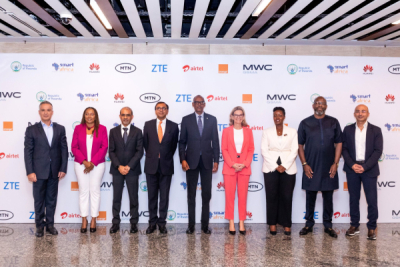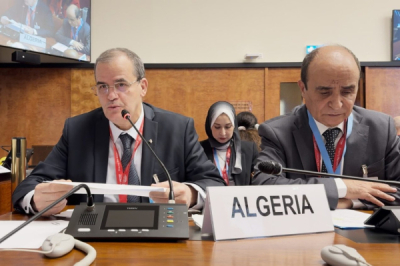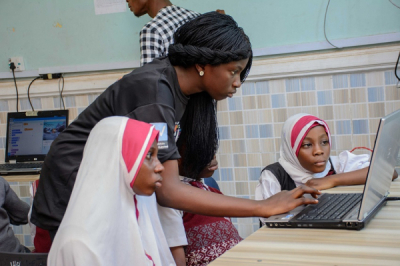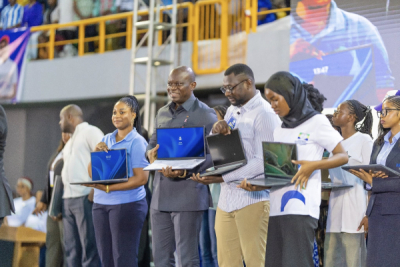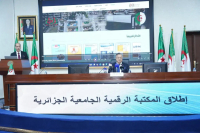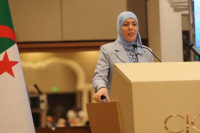
Tech (1151)
- UNICEF and GSMA unveiled the Africa Taskforce on Child Online Protection at MWC25 Kigali.
- Africa has one of the world's fastest rates of children coming online. Young users face cyberbullying, exploitation, harmful content, and AI-driven threats.
- From Policy to Action: The Taskforce implements the GSMA's June 2025 whitepaper recommendations.
In a move to address the growing risks facing Africa's young internet users, UNICEF and the GSMA have launched the Africa Taskforce on Child Online Protection (COP), marking what it says is the continent's first coordinated, multi-stakeholder platform dedicated to digital safety for children.
The initiative, unveiled at Mobile World Congress (MWC) 2025 Kigali, brings together mobile operators, technology companies, regulators, law enforcement agencies, and civil society organizations to implement comprehensive child protection strategies across Africa's rapidly digitalizing landscape.
"As Africa's children step boldly into the digital world, their safety must come first," said Etleva Kadilli, UNICEF Regional Director for Eastern and Southern Africa. "The Africa Taskforce on Child Online Protection is a uniquely African platform to ensure technology shields children from harm while opening doors to learning, play, and growth."
The Taskforce comes as Africa experiences one of the world's fastest rates of digital adoption among young people. GSMA data shows 527 million mobile subscribers in Sub-Saharan Africa by end-2023, representing 44% of the population.
However, this digital revolution brings significant risks. Children across Africa increasingly face cyberbullying, online exploitation, exposure to harmful content, and misinformation – challenges amplified by the continent's mobile-first internet landscape and the rapid emergence of artificial intelligence technologies, says UNICEF.
The Taskforce builds directly on recommendations from the GSMA's June 2025 whitepaper, Enhancing Child Online Protection in Sub-Saharan Africa, developed with UNICEF and regional partners. That report called for coordinated action from governments, industry, civil society, and youth to create safer digital environments.
The Taskforce's founding members represent a cross-section of Africa's digital ecosystem, including major telecommunications operators MTN Group, Orange, Safaricom, Vodacom Group, and Axian Telecom, alongside international organizations such as INTERPOL, the International Centre for Missing and Exploited Children (ICMEC), Internet Watch Foundation, and Child Helpline International.
By centering African voices, particularly young people who represent the continent's demographic majority, the Taskforce aims to develop contextually appropriate interventions that balance protection with the transformative opportunities digital access provides for education, economic participation, and social connection.
The initiative positions Africa to potentially lead global conversations on child-centered digital governance, offering models that prioritize both safety and access in mobile-first, youth-majority populations – characteristics increasingly relevant worldwide.
As the Taskforce begins its work, its success will likely depend on sustained commitment from all stakeholders, adequate resourcing for implementation, and genuine integration of youth perspectives into decision-making processes.
Hikmatu Bilali
- €12M EU funding pledged for Nigeria’s tech talent training
- Nigeria eyes digital leap, Denmark leads global e-governance ranks
Nigeria and Denmark have signed a Memorandum of Understanding (MoU) to deepen cooperation on digital infrastructure, artificial intelligence (AI), connectivity, and innovation.
The agreement was signed by Bosun Tijani, Nigeria’s Minister of Communications, Innovation and Digital Economy, and Lina Gandløse Hansen, Denmark’s State Secretary for Trade and Investment, during the fourth annual Nordic Nigeria Connect event held in Lagos on Tuesday, Oct. 21.
“We will work together to scale broadband infrastructure, pilot smart digital governance solutions, and facilitate pathways for Nigerian tech talent to contribute to Danish companies both remotely and in person,” Tijani said in a statement posted on X on Wednesday, Oct. 22.
He added that Denmark has pledged €12 million in funding, provided through the European Union, for Nigeria’s 3MTT program, which aims to train 3 million tech talents.
Tijani described the MoU as proof of Nigeria’s drive to build partnerships and tailor global best practices to local realities.
The move comes as Nigeria works to narrow its wide digital gap. Denmark tops the United Nations’ e-Government Development Index (EGDI), ranking first among 193 countries with a score of 0.9847, far above the global average of 0.6382. Nigeria is ranked 144th with a score of 0.4815.
Denmark also ranks in Tier 1 of the International Telecommunication Union’s (ITU) 2024 Global Cybersecurity Index (GCI), scoring a perfect 20/20 across all five assessment areas. Nigeria is classified in Tier 3, showing it must step up efforts in organization, capacity building, and cooperation.
The signing of the MoU marks progress after months of talks, but it does not yet guarantee effective cooperation. Neither side has given a timeline for a formal agreement or for implementing the deal.
Isaac K. Kassouwi
Over the past year, artificial intelligence (AI) and its transformative potential have captured global attention. AI's capacity to help achieve the 2030 Sustainable Development Goals (SDGs) is now well established. For Africa, fully embracing this technology has become an urgent necessity.
The GSMA, the global association for mobile operators, has partnered with six of Africa’s major mobile companies (Airtel, Axian Telecom, Ethio Telecom, MTN, Orange, and Vodacom) to launch an ambitious pan-African collaboration.
The initiative, dubbed "AI Language Models in Africa, By Africa, For Africa," was unveiled on Tuesday, Oct. 21, in Kigali, Rwanda, on the sidelines of the Mobile World Congress. Its mission is to develop inclusive language models designed for and by the continent, ensuring African languages, cultures, and knowledge are properly represented in the global digital future.
"Africa’s diversity of languages and cultures is one of our greatest strengths, yet it has too often been overlooked in the development of global AI systems," said Angela Wamola, Head of Africa at the GSMA. "This initiative is about turning that challenge into an opportunity – building African-led AI capacity, empowering innovation across local industries, and ensuring Africa shapes the digital future on its own terms. By working together, we can make AI more inclusive, more relevant, and more reflective of the world we live in."
Orange, which is ahead of the coalition on this issue, will play a decisive role. On Nov. 27, 2024, the French company signed a partnership with OpenAI and Meta to develop AI capable of recognizing and interacting with African languages. The results of that collaboration are expected to allow Orange to improve customer service in African vernacular languages, enhancing user experience, while also contributing to non-commercial projects in sectors like public health and education.
Addressing the Language Gap in Digital Technology
The coalition, which includes digital players, research labs, and innovative startups such as the African Population for Health Research Center (APHRC), Cassava Technologies, Masakhane African Languages Hub, The World Sandbox Alliance, Lelapa AI, Pawa AI, and Qhala, intends to close a critical gap in data, computing power, talent, and public policy.
The vast majority of today's dominant language models are trained on a limited number of "global" languages, leaving Africa's rich linguistic diversity, which comprises thousands of languages, severely underrepresented. This existing "AI language gap" marginalizes billions of potential users. Without adapted models, African populations cannot fully benefit from AI advances in essential areas like education, health, agriculture, or public services.
A growing proportion of the population is connected and uses mobile Internet, with smartphone penetration expected to reach 88% by 2030. While Africa accounts for only 2.5% of the global AI market, recent estimates suggest AI could boost the African economy by $2.9 trillion by 2030, equivalent to a 3% increase in annual gross domestic product growth.
A feasibility study conducted by the GSMA and its partners confirmed the technical and economic viability of locally designed language models. The key to success lies in coordinating efforts to prevent energy dispersion. The coalition will organize itself into thematic working groups, covering data, computing, talent, and policy, and will make its progress public at future GSMA events.
Beyond its symbolic value, the initiative represents a strategic imperative for the continent's development and digital sovereignty. Mastering the data, foundational models, and technical standards is crucial for reducing dependence on external platforms and technologies.
Crucially, models trained on African data will enable the development of applications rooted in local realities. This includes potential applications such as voice assistants that understand Wolof, Swahili, or Amharic, medical triage tools adapted to local contexts, contextualized educational content, or public service agents accessible to all, including in the most widely spoken languages. The GSMA noted that "in Africa alone, more than 2,000 languages are spoken, yet only a fraction are supported in digital systems or AI models. This lack of inclusion risks widening existing digital and economic divides."
Clear Strategy and a Call for Industry Cooperation
The alliance's strategy rests on four essential pillars, each presenting unique challenges. First, data involves collecting millions of words and phrases across African languages, strictly adhering to consent and anonymization rules, and including major languages, local dialects, and spoken language without favoring only cities or elites. Second, computing power for training these AIs requires pooling resources among partners to reduce costs and ensure information security. Third, talent requires training African AI experts and offering attractive careers to retain them on the continent and grow the new industry. Finally, governance requires governments to create a clear legal framework that encourages innovation and investment while protecting citizen data and ensuring the new technologies benefit everyone.
The expected effects are structured across three timeframes: short-term prototypes and region-specific benchmarks; medium-term concrete sectoral applications such as customer service bots and tools for creators; and long-term emergence of autonomous African AI capacity, capable of supporting local champions and enriching the entire ecosystem.
Identified prerequisites for success include transparent governance, funding beyond the prototype stage, strong technical interoperability to prevent isolated efforts, and absolute transparency regarding model performance and biases.
The coalition is issuing a formal call to the entire ecosystem, startups, universities, creative industries, civil society, donors, and major technology companies, to contribute to this collective effort through data, computing power, skills, use cases, or financial support.
Muriel EDJO
- Algeria has mobilized $1 billion to finance African startups and young innovators under a new continental fund launched by President Abdelmadjid Tebboune.
- The initiative aims to boost innovation in strategic sectors including technology, education, health, and humanitarian aid.
- The move comes as African startup funding dropped from $6.5 billion in 2022 to $3.2 billion in 2024, underscoring the need for sustainable, homegrown financing.
Algeria has committed $1 billion to support African startups as part of its effort to stimulate innovation and strengthen regional economic integration, the country’s Minister of Foreign Trade and Export Promotion, Kamel Rezig, said on October 21.
The funding, part of the African Startup and Young Innovators Financing Fund launched in September by President Abdelmadjid Tebboune, targets projects with high social and economic impact across the continent.
Rezig said the fund will “back entrepreneurs working in priority areas such as technology, education, healthcare, and humanitarian services” to foster African creativity and expand intra-continental trade.
The announcement comes amid a sharp decline in startup financing across Africa. Data from Partech Africa show that funding fell from a record $6.5 billion in 2022 to $3.5 billion in 2023, and stabilized at about $3.2 billion in 2024.
Despite the slowdown, the continent’s tech sector has remained resilient, prompting governments and investors to develop more sustainable, locally anchored financial mechanisms.
Domestically, Algeria has built momentum in entrepreneurship. Government data show that by mid-2025 the country hosted 1,600 microenterprises, 130 startups, 1,175 projects labeled “innovative,” and 2,800 registered patents. Authorities aim to grow the number of startups to 20,000 by 2029.
Entities such as Algeria Venture and the National Startup Fund have been instrumental in mentoring entrepreneurs, facilitating access to capital, and connecting innovators with regional networks.
Officials said the continental fund will strengthen collaboration among Algerian and African entrepreneurs in key industries such as fintech, agritech, digital health, and renewable energy.
Over time, the initiative is expected to help structure an integrated African innovation ecosystem capable of generating skilled jobs, accelerating digital transformation, and improving the continent’s economic resilience.
This article was initially published in French by Samira Njoya
Adapted in English by Ange Jason Quenum
- OneNine, founded by Senegalese entrepreneur Doudou Ba and Czech-Vietnamese engineer Duc Anh Tran, is building an AI infrastructure focused on African languages.
- The startup already works with over 160 native contributors and several data companies on pilot projects launched in August 2025.
- OneNine plans to process more than 500,000 hours of linguistic data to position itself as a global leader in underrepresented language datasets.
OneNine, a Sweden-based startup co-founded by Senegalese entrepreneur Doudou Ba and Czech-Vietnamese engineer Duc Anh Tran, is developing an artificial intelligence platform that understands and communicates in African languages.
The company emerged from a key observation: most AI systems are trained on dominant languages such as English, French, or Chinese, overlooking hundreds of languages spoken by millions across Africa. OneNine seeks to bridge this gap by collecting, sorting, annotating, and validating voice and text data in native African tongues.
#OneNine is the Data Supply Chain for AI.
— Doudou BA (@doudou_onenine) October 23, 2025
We provide production ready dataset to AI labs like @OpenAI @Meta @Google @AnthropicAI @xai @netflix @YouTube saving them 70-80 % FTE.
We are highly specialized in low resource languages and mission to make AI understand everyone.… pic.twitter.com/FxVt4aUHqN
Launched in August 2025, OneNine’s platform relies on a network of more than 160 African language contributors, supported by automated data-processing tools. The company has already initiated pilot projects with several linguistic data and research firms.
“Many people cannot read or write, but they can speak — maybe not in English, but in their mother tongue. We want AI to hear them,” said co-founder Doudou Ba.
Ba emphasized that Africa has a crucial role in shaping the future of AI. “The next frontier of AI will not depend solely on building more powerful models, but on creating richer and more diverse datasets. Africa, with its hundreds of languages, holds the world’s largest untapped data resource,” he added.
OneNine’s long-term goal is to become a global leader in linguistic data for underrepresented languages. The startup is building a pipeline estimated at over 500,000 hours of audio and text data.
The company recently joined the Google for Startups program and participated in Norrsken Africa Week, an event dedicated to innovation, entrepreneurship, and investment across the continent.
In the short term, OneNine plans to collaborate with major AI laboratories to refine its models and expand its reach. In the long term, it aims to establish the foundation for a truly inclusive artificial intelligence ecosystem that reflects the world’s linguistic diversity.
This article was initially published in French by Adoni Conrad Quenum
Adapted in English by Ange Jason Quenum
-
President Oligui Nguema unveils “One Student, One Computer” initiative
-
Program aims to reduce the digital divide and promote inclusion
-
Effort aligns with Gabon’s broader digital transformation strategy
Gabonese President Brice Clotaire Oligui Nguema launched the “One Student, One Computer” program on Saturday, October 18, which plans to distribute 10,000 laptops to students. The goal is to equip young people with the tools they need to thrive in an increasingly digital academic and professional environment.
“The future of Gabon depends on an educated, equipped, and determined youth ready to face modern challenges. Digital technology is an opportunity for each of you to learn, innovate, and build a stronger, more prosperous Gabon,” said the president at the launch ceremony.
Led by the Ministry of Digital Economy, Digitalization, and Innovation, the program is part of a broader strategy to close the digital gap and enhance technological inclusion. Beyond providing equipment, it seeks to empower young people to play a central role in the country’s digital transformation.
According to the International Telecommunication Union (ITU), Gabon has made major strides in integrating digital technology into its development agenda, earning a score of 76.1 out of 100 and ranking first in Central Africa ahead of countries such as Senegal and Côte d’Ivoire.
However, the country still lags in preparing talent for artificial intelligence. The “AI Talent Readiness Index for Africa 2025” ranks Gabon 32nd out of 54 African countries, highlighting progress but also the need to strengthen training and the digital ecosystem to catch up with regional leaders.
By providing laptops to students, Gabon is taking a concrete step toward democratizing digital access. To ensure lasting impact, the government will need to complement this effort with measures such as improving nationwide internet connectivity and offering accessible or free training in advanced digital skills, including artificial intelligence, coding, robotics, and other emerging technologies.
In the long term, the initiative could boost academic research, foster local innovation, and prepare a new generation ready to compete in Africa’s and the world’s digital economy, leveraging technology to create new economic and scientific opportunities.
-
Algeria launched a National Digital University Library providing access to 110,990 digitized academic resources, including 90,794 doctoral theses and 15,546 patents.
-
The government targets 500,000 digital documents by 2027 to accelerate the digital transformation of higher education.
-
The initiative aims to enhance research, innovation, and academic accessibility, though challenges such as limited infrastructure and cybersecurity risks remain.
Algeria has launched a National Digital University Library as part of its strategy to modernize higher education and strengthen research through digital innovation. The initiative, led by Higher Education and Scientific Research Minister Kamel Baddari, was unveiled on October 20 in Algiers.
Developed by the Office of University Publications (OPU), the platform gives students, teachers, and researchers access to 110,990 digital academic resources. The collection includes 4,154 OPU publications, 90,794 doctoral theses, 380 Arabic-language works provided by the High Council for the Arabic Language (HCLA), 124 historical books on Algeria’s national movement and the 1954 Revolution, and 15,546 national and international patents integrated in partnership with the National Institute of Industrial Property (INAPI).
From November 2025, Algerian residents abroad will be able to purchase OPU publications online via the platform.
The digital library forms a core part of the ministry’s strategy to digitalize the higher education system and foster an inclusive, connected academic ecosystem.
Minister Baddari said the project “marks a key step in aligning Algeria’s universities with global digital standards and improving access to scientific knowledge.”
Through this initiative, the government seeks to facilitate administrative efficiency, data access, and knowledge sharing across Algeria’s universities, while improving research output and collaboration between institutions.
The ministry aims to expand the collection to 500,000 electronic documents by 2027, signaling a long-term commitment to digital transformation in academia.
The project involves multiple institutional partnerships to enrich the library’s content and ensure interoperability between research centers. Key partners include the HCLA, the Center for Research on Scientific and Technical Information, the National Center for Studies on the National Movement, and the INAPI.
These collaborations are expected to broaden Algeria’s academic and scientific databases, making them accessible through a unified digital interface.
Despite its ambition, the digital transition faces several obstacles. Some universities and regions still lack sufficient technological infrastructure, and students without adequate digital devices may struggle to benefit from the new platform.
Experts have also warned of cybersecurity risks, including data loss, unauthorized access to sensitive information, and technical system failures.
This article was initially published in French by Samira Njoya
Adapted in English by Ange Jason Quenum
-
The program targets 200,000 Moroccan children for training in digital and AI skills.
-
It is part of the “Digital Morocco 2030” strategy to make the country an inclusive and competitive digital hub.
-
The initiative is backed by multiple ministries and the AI Movement Center under UNESCO supervision.
Morocco has launched a national program to train 200,000 children in digital and artificial intelligence (AI) skills, reinforcing its “Digital Morocco 2030” strategy to boost digital inclusion and prepare citizens for the economy of the future.
The government unveiled the initiative on Monday, aiming to equip younger generations with future-oriented skills, promote technology culture, and narrow the digital divide.
The project stems from a partnership signed in March between the Ministries of Digital Transition, Youth, Economy, and Finance, and the International Center for Artificial Intelligence – AI Movement, affiliated with Mohammed VI Polytechnic University and operating under UNESCO supervision.
The first phase was simultaneously launched across 12 cities, mobilizing 65 trainers from participating youth centers. The program will gradually expand nationwide after this pilot phase.
The initiative forms part of Digital Morocco 2030, the kingdom’s long-term strategy to position itself as an inclusive and competitive digital hub. The plan calls for training 100,000 youth annually in digital professions, up from 14,000 in 2022, and includes the creation of specialized schools and support for innovation in emerging technologies.
By introducing 200,000 children to coding, robotics, and AI basics, Morocco aims to cultivate a new generation of digitally empowered citizens capable of driving the country’s digital transformation.
Officials say the program could also strengthen Morocco’s technological sovereignty and consolidate its leadership in innovation on the African continent.
This article was initially published in French by Samira Njoya
Adapted in English by Ange Jason Quenum
-
Burkina Faso launches Faso Andubè to boost tech innovation
-
Platform connects local talent to incubators, promotes “Made in Burkina”
-
Goal: reduce imports, build industrial base, foster tech sovereignty
Burkina Faso’s President Ibrahim Traoré on Friday, Oct. 17, announced the launch of Faso Andubè, a new digital platform designed to highlight Burkinabè talent in science and technology. The initiative aims to connect inventors and innovators in the country and abroad, and support the local production of “Made in Burkina” machinery.
“We will launch a digital platform that will enable anyone with scientific or technical skills to register. They will then be directed to an incubator currently under construction to help Burkina Faso manufacture its own machines,” Traoré said.
The platform is envisioned as a hub for national innovation and expertise. It allows Burkinabè citizens to register and promote their skills through an organized system that offers project monitoring, networking opportunities, and participation in industrial and technological programs.
The initiative supports Traoré’s broader goal of promoting local expertise and mobilizing talent to strengthen national sovereignty. It comes as the country works to expand its industrial base and reduce dependence on imports. According to World Bank data, industry accounted for 29.6% of GDP in 2024, while manufacturing represented just 9.9%.
Faso Andubè aims to serve as a catalyst for Burkina Faso’s tech innovation ecosystem by providing a digital space for collaboration and visibility. It seeks to identify and support scientific and technical talent and spur the creation of locally designed prototypes, agricultural tools, and industrial equipment.
Officials say the project is meant to lay the groundwork for an innovation-driven economy that boosts technological sovereignty, creates jobs, and strengthens the skills of young engineers and technicians.
Samira Njoya
- Dzair Services will serve as a one-stop portal for all government e-services.
- The project is part of Algeria’s 2025–2030 National Digital Transformation Strategy.
- It aims to modernize administration, improve data exchange, and boost efficiency.
Algeria is finalizing the rollout of Dzair Services, a national platform designed to centralize all public digital services. The announcement was made on Wednesday, October 16, 2025, by Meriem Benmouloud, High Commissioner for Digitalization, during the opening of the E-commerce and Online Services Fair (Ecsel Expo) in Algiers. The initiative marks a major milestone in the government’s long-term digital transformation policy.
Designed as a single access point, Dzair Services brings together all existing public digital services in one place. Its goal is to simplify procedures, ensure operational traceability, and reduce institutional overlaps. The government aims to modernize public administration while bringing services closer to citizens and businesses. The platform is expected to become the central interface of Algeria’s online administration.
The project aligns with the National Digital Transformation Strategy 2025–2030, unveiled in May 2025. Structured around seven key pillars, the plan seeks to develop digital infrastructure, strengthen cybersecurity, and consolidate technological sovereignty. It also aims to make digital technology a driver of economic growth through education, innovation, and skilled job creation.
Several major initiatives are already underway. The government has connected 46 ministries and public agencies to fiber optics and launched the national data center in El Mohammedia, with a second facility under construction in Blida. Authorities are also preparing to establish a sovereign cloud to host public data and eventually provide hosting solutions for local companies.
Technically, Dzair Services will rely on an interoperability system that allows public administrations to automatically exchange verified data. This architecture is expected to reduce data duplication, automate cross-checking, and speed up case processing. Nationwide, this interconnection will help produce reliable indicators, facilitate public planning, and lay the groundwork for the future integration of artificial intelligence into state management.
More...
• Congo finalizing Digital Strategy 2030 for tech-driven growth
• Plan targets 4G/5G rollout, e-services, and digital skills training
• Strategy follows progress under 2025 plan, despite key shortfalls
The Republic of Congo is finalizing the implementation of its Digital Strategy 2030, a roadmap designed to accelerate the nation's digital transformation. Léon Juste Ibombo, Minister of Posts, Telecommunications, and the Digital Economy, announced on Monday, October 13, that the document, completed with World Bank financial support, is currently under review by the government's general secretariat before being submitted to the Head of State for final approval by decree.
The plan sets major objectives for the coming decade, including the digitalization of public services, extension of connectivity, training of youth for digital careers, cybersecurity, artificial intelligence, and strengthening digital sovereignty. The 2030 roadmap expands on the ambitions of the outgoing Congo Digital 2025 strategy by placing widespread access to digital services at the core of development policy.
The Congo Digital 2025 strategy achieved measurable progress, with the number of internet users rising from about 1.53 million in 2020 to 2.46 million in early 2025, representing an estimated 38.4% penetration rate, according to DataReportal. The country also initiated 5G deployment, made significant progress on constructing a national data center, and digitized several public services, establishing an operational base for the 2030 plan.
However, structural obstacles continue to slow the impact of these gains. The Congo lags in e-governance, ranking 166th globally in the United Nations’ E-Government Development Index (EGDI), a drop from 161st in 2022. The country scored 0.3391 out of 1 on the index, which assesses the digitization of public services, telecommunications infrastructure, and human capital. Furthermore, with a score of 49.6 out of 100 on the ICT Development Index, the Congo remains below the African average of 56, signaling partial development in infrastructure and digital usage.
The Digital Strategy 2030 aims to correct these shortcomings by converting ambitions into concrete priorities. It plans to accelerate national 4G and 5G coverage, extend the fiber optic network, and ramp up the digitalization of essential public and administrative services. The document also emphasizes training youth and civil servants in digital skills to create a local talent pool capable of sustaining the country’s transformation.
Samira Njoya
-
Finance Ministry requires on-site consumption venues to use e-invoicing
-
Rollout begins in November 2025 and extends to 2028 by business type
-
Reform aims to curb tax evasion and modernize fiscal management
Tunisia’s Ministry of Finance has issued a regulation, published in the Official Journal on Tuesday, October 14, requiring certain food service and on-site consumption businesses to record all transactions through electronic invoicing. The measure seeks to digitize customer services and create a tax system based on actual revenues, in line with equity principles.
The rule applies to restaurants, cafés, tea rooms, and similar establishments offering meals or drinks for on-site consumption. It is based on Article 59 of the Income Tax Code governing individual and corporate tax obligations.
Implementation will be phased in: from November 1, 2025, for corporate entities operating in tourist venues, cafés, and tea rooms of the second and third categories; from July 1, 2026, for other corporate on-site consumption businesses; from July 1, 2027, for self-employed individuals under the real regime with monthly declarations; and from July 1, 2028, for other individuals in the same sector.
The reform aligns with Tunisia’s national digital transformation and tax modernization strategy, as tax evasion is estimated to cost about 3 billion dinars ($1 billion) annually. It follows a June directive urging companies not yet registered in the national e-invoicing system to comply.
Authorities expect the reform to enhance tax transparency, reduce underreporting, align state revenues with actual business activity, and modernize management tools for restaurant and café operators. It is also intended to promote fairer competition within the sector.
A decade ago, Microsoft launched its new operating system to succeed Windows 7, Windows 8, and Windows 8.1. By 2020, the software was already installed on over one billion devices worldwide, including desktop and laptop computers, Xbox One consoles, and HoloLens headsets.
Technical support for Windows 10 officially ended on Tuesday, October 14, marking the end of free software updates, technical assistance, and automatic security patches through Windows Update. Microsoft is now urging users to migrate to Windows 11, which it promotes as faster, simpler, and more secure.
Users already on Windows 11 are unaffected. But those still on Windows 10 face increased cybersecurity risks. The National Agency for Information Systems (ANSI) of Niger issued a warning on October 12, advising public institutions, businesses, and individuals to upgrade immediately.
To install Windows 11, Microsoft requires a 64-bit processor with at least two cores running at 1 GHz, 4 GB of RAM, 64 GB of storage, and a graphics card compatible with DirectX 12 and WDDM 2.0. The company offers a free verification tool, PC Health Check, to determine system compatibility.
Users can download the tool from Microsoft’s website, install it, and run the test to see if their computer can handle Windows 11. If the device doesn’t meet requirements, the tool identifies which component falls short.
For unsupported devices, Microsoft provides a paid program called Extended Security Updates (ESU), which offers critical security patches until 2028 for licensed systems. ANSI warns, however, that remaining on Windows 10 without ESU exposes users to significant security vulnerabilities.
• Senegal launches e-procurement platform to boost transparency
• The platform, APPEL, to digitize full tender process by January 2026
• Reform aligns with national plan to digitize 90% of services
Senegal’s Public Procurement Regulatory Authority (ARCOP) on Tuesday launched the pilot phase of its new electronic public procurement platform, APPEL (Achats Publics en Procédures Électroniques), as part of a broader effort to enhance transparency and strengthen governance.
The initiative aims to digitize the entire public procurement process, improving transparency, ensuring transaction traceability, and speeding up the handling of procurement procedures.
“We’ve been working on this reform for a year. Every week, we hold a technical meeting dedicated to the platform,” said Moustapha Djitté, Director General of ARCOP. “We want reliable indicators on tender processing times, savings achieved, business participation rates, and satisfaction levels among procurement stakeholders.”
The platform covers every stage of the procurement process, from publishing tender notices to awarding contracts. Designed to be modular, secure, and aligned with international standards, it draws inspiration from successful systems in Morocco, Rwanda, and Mauritius. ARCOP also plans to link it with other public databases, including those of the Treasury, tax authorities, and the commercial register, to reinforce transparency, traceability, and sound governance.
The project forms part of Senegal’s national digital strategy, known as the New Deal Technologique, which aims to digitize 90% of public services by 2034. Public procurement, representing between 15% and 20% of national GDP, is a major component of public spending and demands modern management to strengthen investor confidence in Senegal.
Full implementation of the APPEL platform is scheduled for January 2026. The reform is expected to make public procurement more transparent, predictable, and efficient. It should help reduce processing times, curb fraud, increase competition among companies, and generate substantial savings for the state, while reinforcing investor trust and promoting good governance in the public sector.
Samira Njoya




